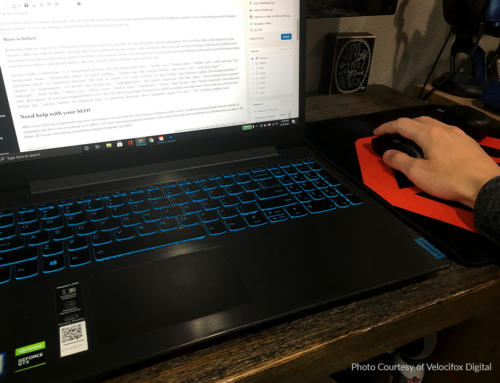Google Authorship
What is it, and why is it important?
We all know that Google is pretty much the king of the search engines. If you’re wondering what the actor’s name was in the movie you saw over the weekend, you don’t “bing it”, nor do you “yahoo it”… you GOOGLE it! Google is the only search engine that has become a verb, and that’s just one of the reasons that it’s on top of the search engine game (for now, anyway).
The thing everybody wants to know is how they can get more attention from Google. Everybody wants to show up higher in the searches, or have their material stand out in some way on the Search Engine Results Page (SERP). Google love = site traffic, and site traffic usually = more business for you. Using the tools that Google provides for their cult-like followers is the key.
Google Authorship is a system that Google has devised to be able to assign “valuable and informative” articles on the internet to the author in a meaningful way, via that person’s Google+ account. The idea is that a person’s authority on a subject would likely increase with each article or blog that they write on a given subject.
Although nobody knows what Google’s exact algorithm is, there is strong evidence to suggest that Google picks up on cues such as the number of articles a person has written on a topic, and uses those cues to suggest useful articles to searchers. If someone wrote 1 blog post about gourmet cooking, but another person has written over 200 blog posts about gourmet cooking, Google would assume that someone searching for gourmet cooking would benefit more from reading an article by the person who has written more on the topic being searched. In a way, Google is deciding who is an authority on specific subjects, and is more likely to show search results from the authors that it deems an authority, than results written by someone else.
So, how do you become a card-carrying member of Google’s magical little authorship club? The steps are easy for a web designer, but have proven to be somewhat difficult for a lot of my clients. For starters, you’ll need to create a Google+ account, and flesh out your profile, photo included. Then, any website that you (or your ghost writer) contributes to, you’ll need to ensure that it’s linked to your Google+ page. You can do this in a number of ways; Google’s help document on the topic suggests that Google will consider the byline and try to match that up to a Google+ account, but this isn’t the case in my experience thus far. Instead, I’ve been simply inserting a line of code at the end of every blog that I write, which looks like a simple link to my Google+ page but contains invisible coding known as “rel=author”, which tells Google that I am the author.
A lot of people have argued whether or not Google Authorship really makes a large difference in the positioning of your articles on the SERP, but I look at it this way: 1) even if it doesn’t help at all with rankings, it places your headshot next to anything you wrote, which statistically increases the odds that someone will click on that link and 2) for anyone to ignore a tool that has been handed down from the search engine gods is just foolish.
The short version is that you need Google Authorship on anything on the internet that is credited to you. Ask your web design company, or simply start tagging your own materials. If you need help tagging your articles, or have more questions, let me know! I’m always happy to help.
Oh, by the way, if this post was useful to you at all, please say “thanks” by liking my Facebook page! It means a lot to me! 🙂







